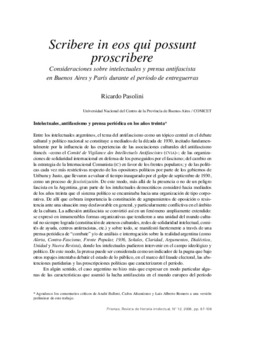Scribere in eos qui possunt proscribere : consideraciones sobre intelectuales y prensa antifascista en Buenos Aires y París durante el período de entreguerras
Abstract
El artículo aborda el problema de la relación entre intelectuales y prensa antifascista tomando como ejes del análisis, por un lado el caso de Vigilance, el órgano de prensa del Comité de Vigilance des Intellectuels Antifascistes de París (1934-1938) y, por el otro, Unidad y Nueva Gaceta, de la Asociación de Intelectuales, Artistas, Periodistas y Escritores (AIAPE) de Buenos Aires (1935-1943). A partir de allí, se intenta caracterizar desde una perspectiva inicialmente comparativa el modo en que se dan los pasajes del “clerc” a la política (y de la política al “clerc”), con el propósito de advertir no sólo los elementos y tópicos comunes en el marco de la lucha antifascista internacional, sino las particularidades locales. A partir del análisis de la figura intelectual y del itinerario de Aníbal Ponce, se plantea la hipótesis de que la AIAPE no sólo está recorrida por tensiones internas que remiten a grandes modelos ideológicos, sino también por los lugares que se ocupan o se pretenden ocupar en el mundo intelectual. The article examines the relationship between intellectuals and anti-fascist press, discussing the publication Vigilance, (Comité de Vigilance des intellectuels Antifascistes de Paris, 1934-1938), and the magazines Unity and New Gazette, of the Association of Intellectuals, Artists, Journalists and Writers (AIAPE) in Buenos Aires (1935-1943). From there, it examines the passage of intellectuals to the world of politics, and the political action into intellectual world, with the aim of observing the common elements in the international anti-fascist struggle, and the local elements in the Argentine case.

